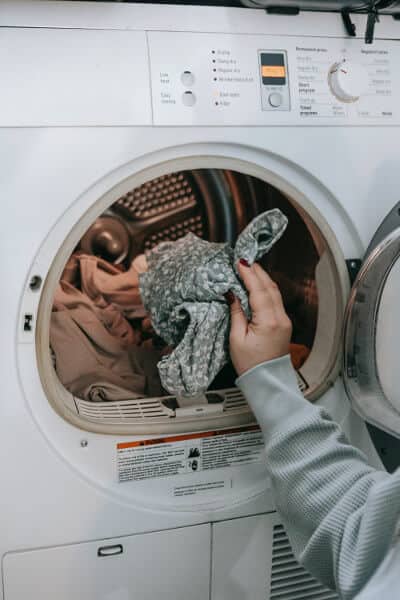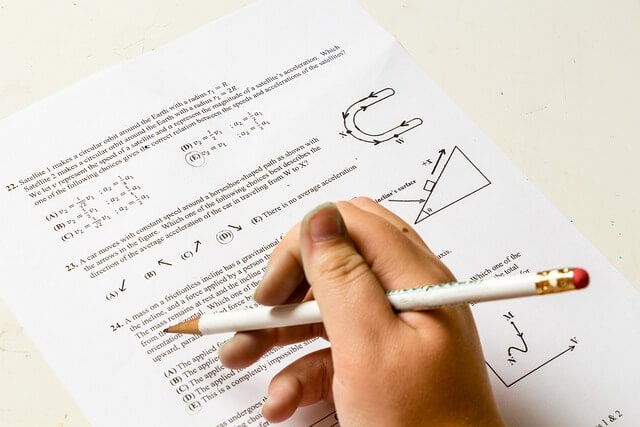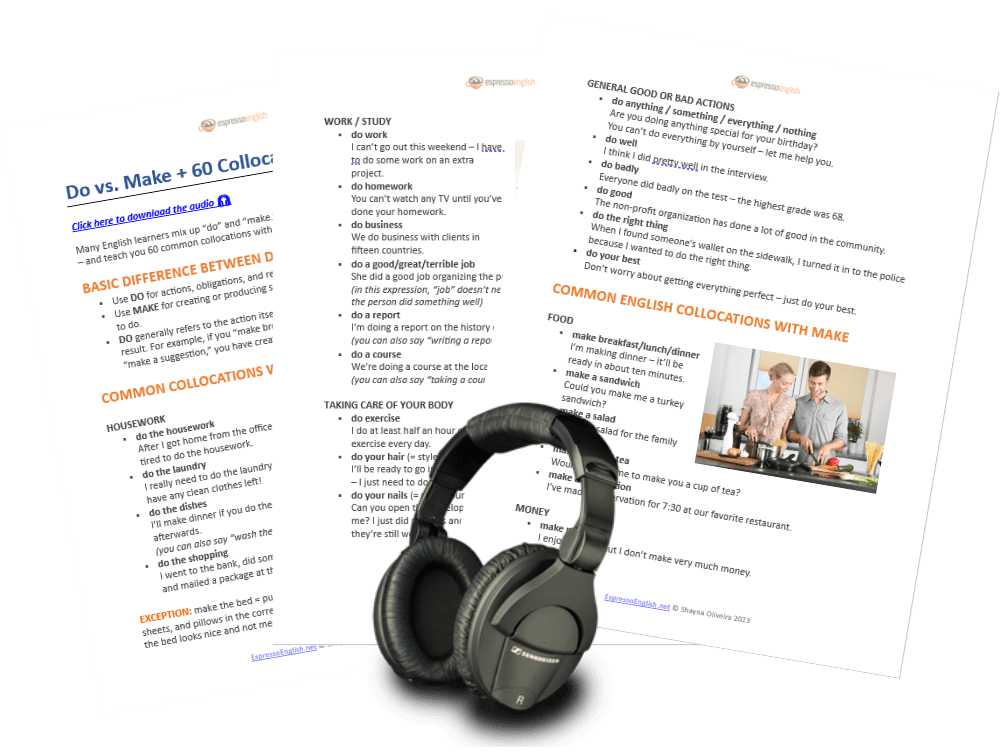
What’s the difference between DO and MAKE? Today I’ll teach you when to use these words in English – plus 60 common collocations with example sentences!
Basic Difference between DO and MAKE
- Use DO for actions, obligations, and repetitive tasks.
- Use MAKE for creating or producing something, and for actions you choose to do.
- DO generally refers to the action itself, and MAKE usually refers to the result. For example, if you “make breakfast,” the result is an omelet! If you “make a suggestion,” you have created a recommendation.
Common English Collocations with DO
HOUSEWORK
- do the housework
After I got home from the office, I was too tired to do the housework. - do the laundry
I really need to do the laundry – I don’t have any clean clothes left! - do the dishes
I’ll make dinner if you do the dishes afterwards.
(you can also say “wash the dishes”) - do the shopping
I went to the bank, did some shopping, and mailed a package at the post office.
EXCEPTION: make the bed = putting blankets, sheets, and pillows in the correct place so that the bed looks nice and not messy.

Do the laundry
WORK / STUDY
- do work
I can’t go out this weekend – I have to do some work on an extra project. - do homework
You can’t watch any TV until you’ve done your homework. - do business
We do business with clients in fifteen countries. - do a good/great/terrible job
She did a good job organizing the party.
(in this expression, “job” doesn’t necessarily refer to work. It simply means the person did something well) - do a report
I’m doing a report on the history of American foreign policy.
(you can also say “writing a report”) - do a course
We’re doing a course at the local university.
(you can also say “taking a course”)

Do homework
TAKING CARE OF YOUR BODY
- do exercise
I do at least half an hour of exercise every day. - do your hair (= style your hair)
I’ll be ready to go in 15 minutes – I just need to do my hair. - do your nails (= paint your nails)
Can you open this envelope for me? I just did my nails and they’re still wet.

Do exercise
GENERAL GOOD OR BAD ACTIONS
- do anything / something / everything / nothing
Are you doing anything special for your birthday?
You can’t do everything by yourself – let me help you. - do well
I think I did pretty well in the interview. - do badly
Everyone did badly on the test – the highest grade was 68. - do good
The non-profit organization has done a lot of good in the community. - do the right thing
When I found someone’s wallet on the sidewalk, I turned it in to the police because I wanted to do the right thing. - do your best
Don’t worry about getting everything perfect – just do your best.
Learn 1000 collocations FAST!

Get this e-book
Common English Collocations with MAKE
FOOD
- make breakfast/lunch/dinner
I’m making dinner – it’ll be ready in about ten minutes. - make a sandwich
Could you make me a turkey sandwich? - make a salad
I made a salad for the family picnic. - make a cup of tea
Would you like me to make you a cup of tea? - make a reservation
I’ve made a reservation for 7:30 at our favorite restaurant.

Make breakfast / lunch / dinner
MONEY
- make money
I enjoy my job, but I don’t make very much money. - make a profit
The new company made a profit within its first year. - make a fortune
He made a fortune after his book hit #1 on the bestseller list. - make $_______
I made $250 selling my old CDs on the internet.

RELATIONSHIPS
- make friends
It’s hard to make friends when you move to a big city. - make love (= have sex)
The newlyweds made love on the beach during their honeymoon. - make a pass at (= flirt with someone)
My best friend’s brother made a pass at me – he asked if I was single and tried to get my phone number. - make fun of someone (= tease / mock someone)
The other kids made fun of Jimmy when he got glasses, calling him “four eyes.” - make up (= resolve a problem in a relationship)
Karen and Jennifer made up after the big fight they had last week.

Make up after an argument
COMMUNICATION
- make a phone call
Please excuse me – I need to make a phone call. - make a joke
He made a joke, but it wasn’t very funny and no one laughed. - make a point
Dana made some good points during the meeting; I think we should consider her ideas. - make a bet
I made a bet with Peter to see who could do more push-ups. - make a complaint
We made a complaint with our internet provider about their terrible service, but we still haven’t heard back from them. - make a confession
I need to make a confession: I was the one who ate the last piece of cake. - make a speech
The company president made a speech about ethics in the workplace. - make a suggestion
Can I make a suggestion? I think you should cut your hair shorter – it’d look great on you! - make a prediction
It’s difficult to make any predictions about the future of the economy. - make an excuse
When I asked him if he’d finished the work, he started making excuses about how he was too busy. - make a promise
I made a promise to help her whenever she needs it.
(you can also say, “I promised to help her whenever she needs it.”) - make a fuss (= demonstrate annoyance)
Stop making a fuss – he’s only late a couple minutes. I’m sure he’ll be here soon. - make an observation
I’d like to make an observation about our business plan – it’s not set in stone, so we can be flexible. - make a comment
The teacher made a few critical comments on my essay.
EXCEPTION: Don’t say “make a question.” The correct phrase is “ask a question.”

Make a speech
PLANS & PROGRESS
- make plans
We’re making plans to travel to Australia next year. - make a decision/choice
I’ve made my decision – I’m going to go to New York University, not Boston University. - make a mistake
You made a few mistakes in your calculations – the correct total is $5430, not $4530. - make progress
My students are making good progress. Their spoken English is improving a lot. - make an attempt / effort (= try)
I’m making an effort to stop smoking this year. - make up your mind (= decide)
Should I buy a desktop or a laptop computer? I can’t make up my mind. - make a discovery
Scientists have made an important discovery in the area of genetics. - make a list
I’m making a list of everything we need for the wedding: invitations, decorations, a cake, a band, the dress… - make sure (= confirm)
Can you make sure we have enough copies of the report for everybody at the meeting? - make a difference
Getting eight hours of sleep makes a big difference in my day. I have more energy! - make an exception
Normally the teacher doesn’t accept late homework, but she made an exception for me because my backpack was stolen with my homework inside it.

Make a list
Learn more: Affect vs. effect + collocations


